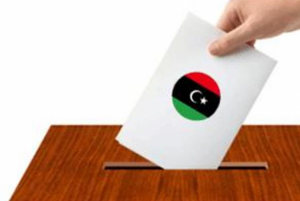By Sami Zaptia.

Tripoli, 6 November 2021:
While the world continues to push for Libyan elections to be held on 24 December 2021, the unelected (since 2015) High State Council (HSC) continues to indirectly seek to prevent the holding of elections at any cost.
On Wednesday during a press conference in Tripoli, Khaled Mishri, the head of the HSC, reaffirmed his actual anti-election stance by announcing that he is challenging the holding of elections in the Constitutional Chamber of the Supreme Court.
During the press conference, Mishri on the face of it stressed his position in support of the electoral process but insisted on them being on what he called ‘‘sound legal and constitutional foundations’’.
He said he rejected the electoral laws issued by the House of Representatives unilaterally, violating the political agreement (Skhirat 2015 LPA) and the (2011) constitutional declaration.
He stressed that the HSC has taken all legal measures against these laws and challenged them before the Constitutional Chamber of the Supreme Court.
Analysis: Status quo dinosaurs
It will be recalled that Mishri is conveniently hiding behind the fig-leaf of legality and constitutionality when there is nothing about Libya’s current political system that is fully legal or constitutional. The process since the 2014 Tripoli militia coup has been political patch-ups and compromises rather than constitutionally sound processes.
They were fixes designed to prevent all-out war between the militias and the total disintegration of Libya.
Mishri depends on Libya’s inability to agree a legal, constitutional constitution. He builds his existence on Libya’s political and ethnic fault lines. He knows a referendum on the draft constitution will not happen for a year or years. Such a referendum needs reconciliation and a consensus between the various political, regional, tribal, and ethnic Libyan strata.
Arab consensus with Tebu, Tuareg and Amazigh minorities needed
It needs the majority Arab Libyans to reach a settlement with the country’s ethnic Tebu, Tuareg and Amazigh minorities. That is not on the horizon anytime soon. Mishri and his HSC know that and are counting on that to prevent the holding of any ‘‘constitutionally-based’’ elections any time soon.
A child of the LPA
Mishri and his rump of ex-General National Congress (GNC) that make up the HSC were a political creation in the Skhirat 2015 Libyan Political Agreement (LPA). They were never elected, and what is more important, they know they will never be re-elected as a body and probably as most individuals.
The surest way for the individual members of the HSC and the HSC as a body to lose their Libyan political significance (and the nice salaries that go with it) is for Libya to hold elections. They know they are dinosaurs on their way out.
Libyan politics has moved on, but not its intransigent politicians
Politically, Libya in 2021 is not Libya in 2014 to 2015. The boundaries have been blurred. The so-called ‘‘Islamist v liberal’’ divide for one, has been distorted. Indeed, that framework for many Libyans still exists as the spectrum with which to judge politicians, but in reality, Libyan politics have become multi-layered and more nuanced and complex than in 2015.
The political scene has been recoalescing repeatedly. Libya has moved on, but the GNC rump that is the HSC is still fighting yesterday’s battle. They, and the House of Representatives, are desperate to remain relevant. Peace does not serve them. Tension, and especially across the ‘‘Islamist anti-Islamist’’ divide justifies their existence. Their best ally is ironically Khalifa Hafter. They justify each other’s existence.
However, the public is fed up with the ineffective dinosaur politicians dominating the scene since 2011. They want better governance and better services – both of which the current group have failed to deliver.
A change for the sake of change?
The general public see elections as the mechanism for a clean sweep to get rid of most the current deadwood political elite and give a chance to a new group. There is no guarantee that the next lot will be any better – but the public has reached a stage where they want a change even if it is for the sake of change. They see no hope with the current HSC or parliament. The LPA is outdated and the Libyan Political Dialogue Forum (LPDF) seems to have been born dead.
Elections are the only way forward. The HSC and parliament fear their political end. And both may, just may totally disappear as a result of the holding of elections! No wonder they are conspiring in the most fanciful ways to obstruct the holding of elections!








